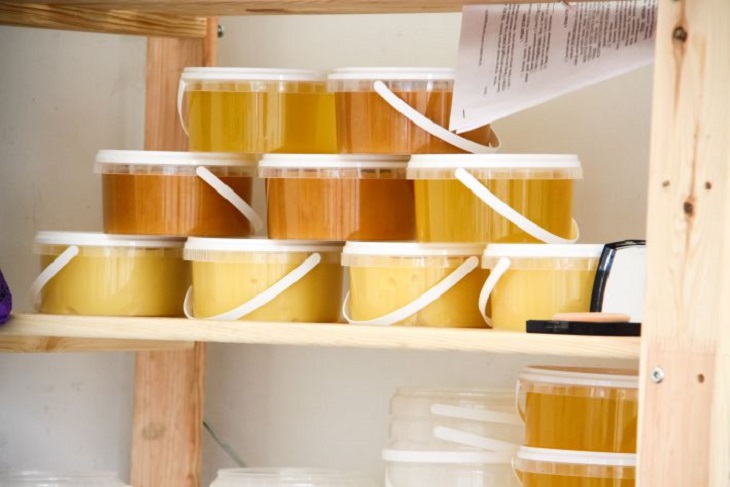When you want your food to stay fresh as long as possible, you put it straight in the refrigerator, right?
However, this is not an ideal place to store all foods, as some types of fruits and vegetables do not need to be stored at all.
like cool climates and do much better at room temperature.
In this article, we will tell you which products have no place in the refrigerator.
1. Honey.
Honey is ideal with hot milk, breakfast, any dessert or use in baking. However, it is strictly forbidden to store it in the refrigerator, otherwise it will become very hard and lose its wonderful aroma.

It is better to store honey at room temperature, away from direct sunlight and in a sealed container, because this is how this beekeeping product feels most comfortable. By the way, honey can be stored especially long in a cellar or basement, or at a temperature of 15 degrees Celsius.
It is also important to keep this product away from foreign odors, as honey tends to absorb foreign odors quickly. You can still consume crystallized or hardened honey without hesitation. This is a natural reaction when it stands for a long time.
2. Olive oil.
Buying large bottles of olive oil if you use it in small quantities is not worth it. The oil has a strict ban on storing in the refrigerator, as it quickly becomes rancid, hardens and loses its taste.
It may also happen that olive oil that is in the refrigerator becomes cloudy and starts to separate. However, it is still edible, and the cloudiness disappears when the bottle is heated.
However, if stored at room temperature, the oil reveals all its aroma and has a particularly pleasant taste.
It is best to store it not only at room temperature, but also in a well-protected place from light, for example, in dark glass bottles or canisters. Alternatively, if you use quite a large amount of olive oil, you can buy it in a large canister and, when necessary, pour it into small dark bottles for convenience.
3. Onion and garlic.
Onions and garlic are also among the products that should not be stored in the refrigerator. Because the cold causes aromatic vegetables to rot faster and lose their rich taste. It is better to store them in a cool, dark and dry place.
Also, onions should not be stored in plastic bags, as they will sweat and start to rot. You should also avoid too light an environment, as this will cause them to sprout faster. As for garlic, it is best to store it in a ceramic container with a lid. But a paper bag will do, too.
4. Bread.
Avoid putting bread in the refrigerator, as it becomes hard and loses its flavor in the cold. It goes stale in the refrigerator due to retrogradation, where the starch molecules in the bread lose water, causing it to become sticky and tasteless. However, it is best to store fresh bread in an unglazed ceramic or clay pot at room temperature, around 18 degrees Celsius.
If you buy too much bread, you can pack it, sliced, into a bag, seal it tightly and freeze it.
Whenever you need bread, you can take out the desired number of slices and then bake them in the oven or toaster.
5. Avocado.
The green flesh of the avocado can be eaten as a separate dish or used to make a flavorful guacamole sauce. However, unripe avocados should never be stored in the refrigerator, because low temperatures interrupt the ripening process and reduce their flavor. It is better to store avocados at room temperature.
6. Tomatoes.
Tomatoes are also a food that does not belong in the refrigerator. At a temperature of 12 to 16 degrees Celsius, they retain their aroma especially long. While too low a temperature affects the taste, too high a temperature accelerates the process of rotting tomatoes. Lighting also plays a role in storing tomatoes. They prefer shade and higher humidity. Sunlight, on the other hand, promotes ripening, so they can quickly become overripe.
7. Potatoes.
Most amateur cooks store potatoes in the basement or pantry. And rightly so! In a cool climate (4 to 15 degrees Celsius) in a dry, dark place, potatoes stay fresh longer. The ban on storing in the refrigerator is quite important, since when strongly cooled, the tubers become mealy, and the starch turns into sugar.
It is also advisable to put the potatoes in a linen bag after purchase. If you store them in a pantry or similar place, cover the potatoes with paper. This will prevent the tubers from prematurely wrinkling and turning green.
8. Mango.
Unripe mangoes are also among the foods that should not be refrigerated, as cold temperatures significantly slow down the ripening process. This also increases the likelihood that the fruit will spoil in the refrigerator.
Instead, store unripe mangoes at room temperature with other fruits such as apples and bananas.
You can also speed up the ripening process by placing the mango in a paper bag with a ripe apple.
On the other hand, if your fruit is already ripe but you don’t want to eat it yet, it is recommended to freeze it. To do this, remove the skin and core of the mango and freeze it in small pieces. In addition, you can also make chutney or jam from the excess mango.








